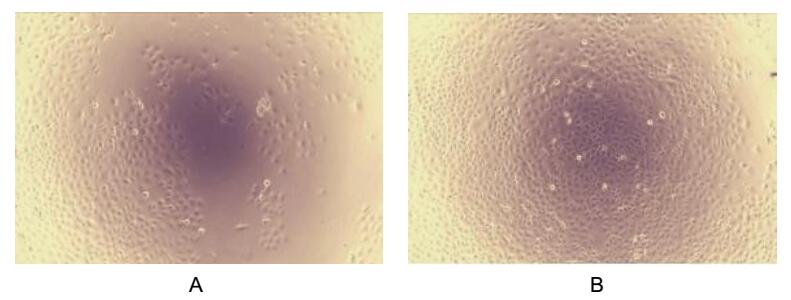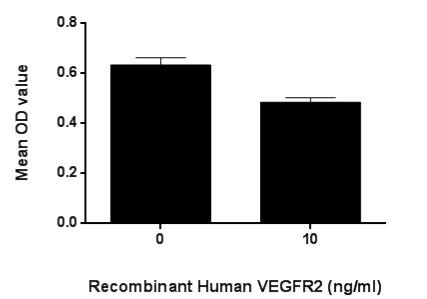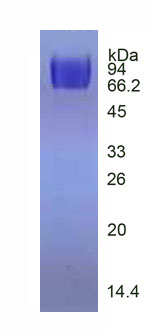
Details
ACTIVITY TEST
Buffer Formulation PBS, pH7.4, containing 0.01% SKL, 5% Trehalose. Traits Freeze-dried powder Purity > 97% Isoelectric Point 6.5 Applications Cell culture; Activity Assays.

Figure. Cell proliferation of ECV-304 cells inhibit by VEGFR2.
Vascular Endothelial Growth Factor Receptor 2 (VEGFR2) also known as kinase insert domain receptor acts as a cell-surface receptor for VEGFA, VEGFC and VEGFD. VEGFR2 functions as the primary mediator of vascular endothelial growth factor activation in endothelial cells. Regulation of VEGFR-2 expression appears critical in mitogenesis, differentiation, and angiogenesis. To test the effect on inhibit the VEGF-dependent proliferation of endothelium cells, ECV-304 cells were seeded into triplicate wells of 96-well plates at a density of 5,000 cells/well and allowed to attach, replaced with serum-free overnight, then the medium was replaced with 2% serum standard DMEM including 1μg/mL Vascular Endothelial Growth Factor C (VEGFC) and various concentrations of recombinant human VEGFR2. After incubated for 96h, cells were observed by inverted microscope and cell proliferation was measured by Cell Counting Kit-8 (CCK-8). Briefly, 10µL of CCK-8 solution was added to each well of the plate, then the absorbance at 450nm was measured using a microplate reader after incubating the plate for 1-4 hours at 37℃. Proliferation of ECV-304 cells after incubation with VEGFR2 for 96h observed by inverted microscope was shown in Figure 1. Cell viability was assessed by CCK-8 (Cell Counting Kit-8) assay after incubation with recombinant VEGFR2 for 96h. The result was shown in Figure 2. It was obvious that VEGFR2 significantly inhibit cell viability of ECV-304.
(A) ECV-304 cells cultured in DMEM, stimulated with 10ng/mL VEGFR2 for 96h;
(B) Unstimulated ECV-304 cells cultured in DMEM for 96h.
Figure. VEGFR2 inhibit VEGF-dependent proliferation of ECV-304 cells.
USAGE
Reconstitute in 10mM PBS (pH7.4) to a concentration of 0.1-1.0 mg/mL. Do not vortex.
STORAGE
Avoid repeated freeze/thaw cycles. Store at 2-8°C for one month. Aliquot and store at -80°C for 12 months.
STABILITY
The thermal stability is described by the loss rate. The loss rate was determined by accelerated thermal degradation test, that is, incubate the protein at 37°C for 48h, and no obvious degradation and precipitation were observed. The loss rate is less than 5% within the expiration date under appropriate storage condition.
Image

Figure. Gene Sequencing (Extract)
Image

Figure. SDS-PAGE
Partial purchase records(bought amounts latest0)
User Comment(Total0User Comment Num)
- No comment


 +86 571 56623320
+86 571 56623320




